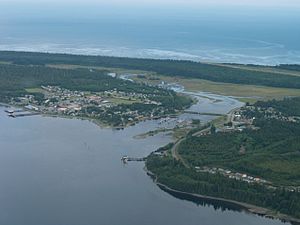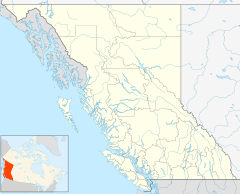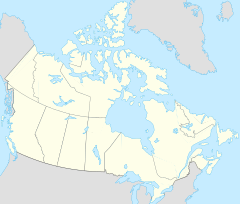Masset facts for kids
Quick facts for kids
Masset
|
|
|---|---|
|
Village
|
|
| Village of Masset | |
 |
|
| Country | Canada |
| Province | British Columbia |
| Region | Haida Gwaii |
| Regional district | North Coast |
| Incorporated | 1961 |
| Area | |
| • Total | 19.45 km2 (7.51 sq mi) |
| Elevation | 10 m (30 ft) |
| Population
(2016)
|
|
| • Total | 793 |
| • Density | 40.77/km2 (105.60/sq mi) |
| Time zone | UTC−8 (PST) |
| • Summer (DST) | UTC-7 (PDT) |
| Highways | |
| Waterways | Dixon Entrance |
Masset is a village located in the Haida Gwaii islands in British Columbia, Canada. It sits on Masset Sound on the northern coast of Graham Island. Graham Island is the largest island in the Haida Gwaii group. Masset is about 50 kilometers (31 miles) west of the mainland of British Columbia. It is the main western end of Trans-Canada Highway 16. The village also has the Masset Airport, which offers flights to Vancouver and Prince Rupert. In the early 1800s, Masset was a very important place for trading furs. It officially became a village municipality on May 11, 1961.
Contents
What's in a Name?
The name Masset was given by the captain of a Spanish ship. This ship was repaired with help from the Haida people of three villages: Atewaas, Kayung, and Jaaguhl. These villages accepted the name Masset. It was a way to remember what might have been the very first time Europeans met the Haida people.
Later, during the early days of Canadian settlement, a man named Reverend Charles Harrison used the name Masset for his land selling plans.
Today, the name Masset is used for two different places. One is the Village of Masset, which is a municipality under Canadian law. The other is the Village of Old Massett. Old Massett is the original village that received the name. It operates under the laws of the Haida Nation.
Some history books say that Masset comes from the Haida word Masst. This word means "large island." In 1789, Captain Douglas named the bay leading to the inlet "McIntyre's Bay." American traders later called it "Hancock's River." The British officially adopted the name Masset in 1853.
In the local Haida language, Masset's name is Uttewas. This means "white slope," likely referring to a small hill near the village.
How Many People Live Here?
In 2021, the village of Masset had a population of 838 people. These people lived in 399 homes. This was a small increase from its population of 793 people in 2016. The village covers a land area of about 20.69 square kilometers (8 square miles).
Military Base
Masset is home to a special Canadian Forces facility. It's called Canadian Forces Station Leitrim Detachment Masset. This station was first set up in 1943 as Naval Radio Station Masset. It helps the Canadian Forces gather signals intelligence. This means they collect information from electronic signals. The equipment at CFS Masset is controlled from CFS Leitrim, which is near Ottawa, Ontario.
Famous People from Masset
Many talented people come from Masset. Here are a few:
- Guujaaw – A skilled wood carver, musician, and traditional medicine expert. He is also a political activist.
- Michael Nicoll Yahgulanaas – An artist famous for his unique Haida manga style.
- Robert Davidson (artist) – A very well-known Haida artist.
- Florence Davidson – An artist who shared Haida culture through her work.
- Reg Davidson – Another talented carver from the community.
Masset's Weather
Masset has a mild climate. This is because of a warm ocean current from Japan that flows nearby. The temperature doesn't change much throughout the year. However, the weather can be unpredictable, even within a single day!
On average, Masset gets about 1337.4 millimeters (52.65 inches) of rain each year. It also gets about 75.3 centimeters (29.6 inches) of snow. There is usually a breeze. When it's raining, the wind often comes from the southeast. When it's sunny, it usually comes from the northwest.
In summer, temperatures are usually between 15 and 20 degrees Celsius (59 to 68 degrees Fahrenheit). The days are very long in May, June, and July, with about 18 hours of daylight. August and May usually have the most sunshine. However, it can still rain quite a bit during the summer months.
Winter months are mild, with temperatures usually between 0 and 8 degrees Celsius (32 to 46 degrees Fahrenheit). Most of the time, precipitation is rain, but sometimes it snows. The weather can become severe very quickly. Masset has recorded strong wind gusts up to 160 kilometers per hour (99 miles per hour)!
Even though Masset is far north, its rainfall pattern is similar to places with a Mediterranean climate. This means it gets more rain in winter and less in summer. It's one of the northernmost places in the world with this kind of weather.
| Climate data for Masset | |||||||||||||
|---|---|---|---|---|---|---|---|---|---|---|---|---|---|
| Month | Jan | Feb | Mar | Apr | May | Jun | Jul | Aug | Sep | Oct | Nov | Dec | Year |
| Record high °C (°F) | 15.6 (60.1) |
14.4 (57.9) |
17.8 (64.0) |
22.2 (72.0) |
25.0 (77.0) |
27.2 (81.0) |
28.3 (82.9) |
28.9 (84.0) |
23.9 (75.0) |
21.7 (71.1) |
18.9 (66.0) |
15.6 (60.1) |
28.9 (84.0) |
| Mean daily maximum °C (°F) | 5.1 (41.2) |
6.0 (42.8) |
7.2 (45.0) |
9.6 (49.3) |
12.7 (54.9) |
15.3 (59.5) |
17.3 (63.1) |
18.2 (64.8) |
16.1 (61.0) |
12.2 (54.0) |
8.2 (46.8) |
5.9 (42.6) |
11.1 (52.0) |
| Daily mean °C (°F) | 2.4 (36.3) |
3.0 (37.4) |
3.8 (38.8) |
5.8 (42.4) |
8.7 (47.7) |
11.5 (52.7) |
13.7 (56.7) |
14.3 (57.7) |
12.1 (53.8) |
8.5 (47.3) |
5.1 (41.2) |
3.5 (38.3) |
7.8 (46.0) |
| Mean daily minimum °C (°F) | −2.2 (28.0) |
−0.4 (31.3) |
0.6 (33.1) |
2.1 (35.8) |
4.6 (40.3) |
7.6 (45.7) |
9.9 (49.8) |
10.5 (50.9) |
8.0 (46.4) |
4.8 (40.6) |
2.0 (35.6) |
0.6 (33.1) |
4.8 (40.6) |
| Record low °C (°F) | −18.9 (−2.0) |
−14.4 (6.1) |
−12.8 (9.0) |
−7.8 (18.0) |
−2.8 (27.0) |
0.0 (32.0) |
1.7 (35.1) |
1.7 (35.1) |
−2.8 (27.0) |
−8.3 (17.1) |
−11.1 (12.0) |
−13.3 (8.1) |
−18.9 (−2.0) |
| Average precipitation mm (inches) | 143.3 (5.64) |
111.9 (4.41) |
110.9 (4.37) |
100.9 (3.97) |
80.7 (3.18) |
65.8 (2.59) |
69.7 (2.74) |
72.0 (2.83) |
112.1 (4.41) |
186.4 (7.34) |
181.4 (7.14) |
176.9 (6.96) |
1,412 (55.59) |
| Source: Environment Canada | |||||||||||||



